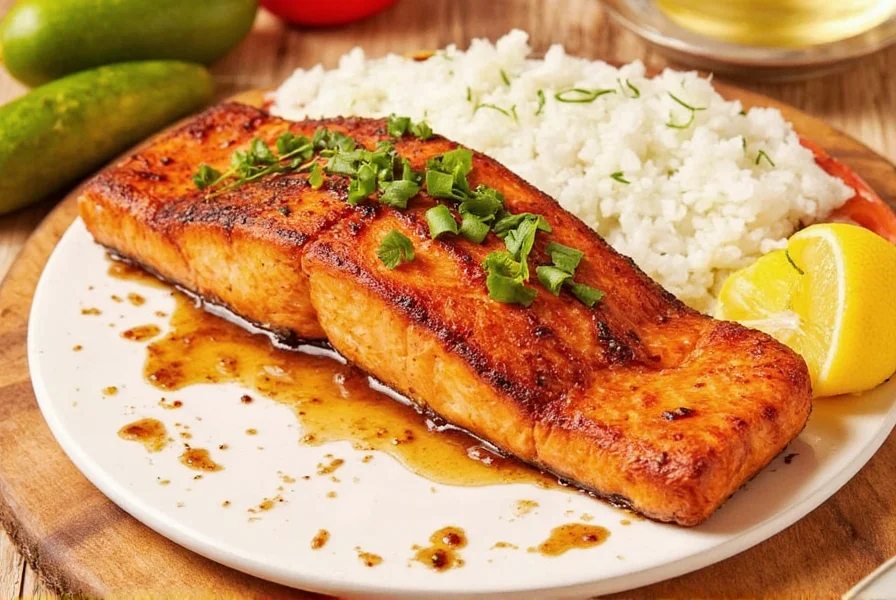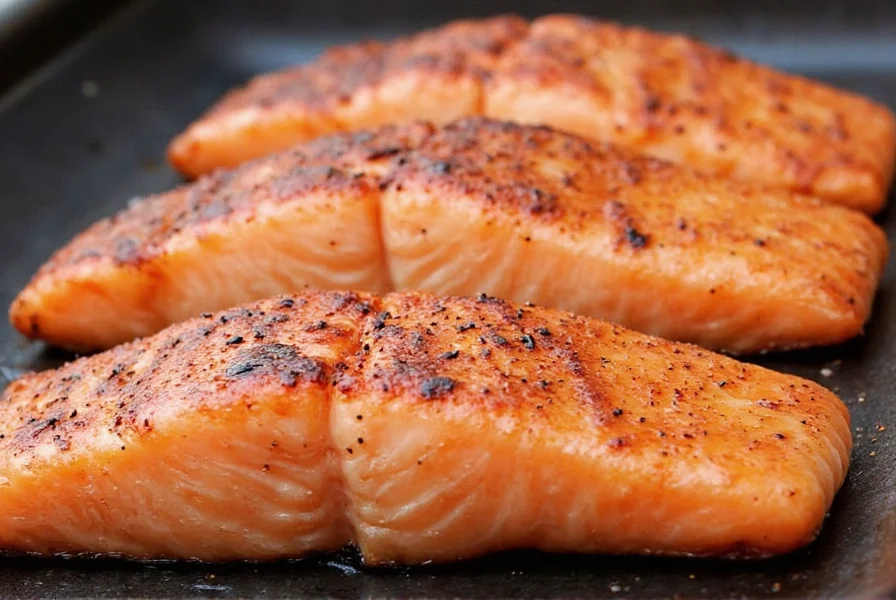Table of Contents
Introduction: How to Grill Salmon Perfectly
Grilling salmon is a simple yet rewarding cooking method that delivers tender, flavorful results when done correctly. This complete guide covers every step from preparation to serving, including essential seasoning techniques, precise grilling times, temperature control, and expert tips to ensure perfect results every time. Whether you're a beginner or experienced cook, follow these instructions for restaurant-quality grilled salmon.

Preparation Steps for Grilled Salmon
Proper preparation is key to preventing sticking and achieving a crispy exterior. Follow these steps before grilling:
- Pat dry: Use paper towels to thoroughly dry the salmon fillet. Moisture causes sticking and prevents proper searing.
- Check for bones: Remove any pin bones with tweezers for a better eating experience.
- Preheat the grill: Heat to medium-high (375-400°F / 190-200°C). Clean grates and oil them with a paper towel dipped in vegetable oil to prevent sticking.
- Bring to room temperature: Let salmon sit for 15 minutes before grilling for even cooking.
Seasoning Basics for Grilled Salmon
Seasoning enhances natural flavors without overpowering the fish. Follow these principles:
- Salt: Use 1/4 teaspoon per 6-ounce fillet to enhance flavor and draw out moisture for better searing.
- Pepper: Add a pinch for depth and subtle heat.
- Oil: Brush lightly with olive oil before seasoning to help spices adhere and prevent sticking.
- Herbs and spices: Use fresh or dried herbs like dill, garlic, or paprika for layered flavor. Remember: less is more—salmon's delicate taste should shine through.
Grilling Process: Temperature and Timing
Mastering grilling temperature and timing ensures perfectly cooked salmon every time:
- Place skin-side down: If skin-on, place skin-side down first for crispier skin and easier flipping.
- Grill time: Cook for 4-6 minutes per side for 1-inch thick fillets. Thicker pieces may need 6-8 minutes per side.
- Temperature control: Maintain medium-high heat (375-400°F / 190-200°C). Use a meat thermometer to check internal temperature—145°F (63°C) is safe for consumption.
- Flip carefully: Use a thin spatula to flip gently only once. Wait until salmon releases easily from the grill to avoid tearing.
- Rest before serving: Let salmon rest for 5 minutes after grilling to redistribute juices and maintain moisture.
| Flavor Profile | Key Ingredients | Best Paired With |
|---|---|---|
| Classic | Salt, pepper, lemon | White wine, fresh herbs, steamed vegetables |
| Smoky | Smoked paprika, garlic, chili | Grilled corn, roasted potatoes, spicy salsa |
| Lemon-Dill | Lemon zest, dill, garlic | Cucumber salad, rye bread, tartar sauce |
| Asian-Inspired | Soy sauce, ginger, sesame oil | Rice, edamame, stir-fried veggies |
| Herb-Infused | Thyme, rosemary, oregano | Quinoa, roasted carrots, green beans |
Buying Guide: Choosing the Right Seasonings
Quality seasonings elevate your grilled salmon. Here are top recommendations for grilling:
1. Herb Blend for Salmon (Dill & Lemon)
This blend combines fresh dill, zesty lemon zest, and a hint of garlic for a bright, refreshing flavor. Ideal for those who love a light, clean taste.
- Features: Natural ingredients, no preservatives
- Advantages: Adds freshness and brightness
- Use Cases: Perfect for summer grilling, seafood platters
- Target Audience: Home cooks, seafood lovers
- Suitable Occasions: Casual dinners, picnics, family gatherings
2. Smoked Paprika & Garlic Rub
For those who enjoy a little heat and smokiness, this rub delivers bold flavor. The combination of smoked paprika, garlic, and black pepper gives the salmon a deep, savory crust.
- Features: Rich, smoky aroma, no artificial additives
- Advantages: Creates a flavorful crust and enhances the natural taste of salmon
- Use Cases: Grilling, roasting, baking
- Target Audience: BBQ enthusiasts, adventurous eaters
- Suitable Occasions: Barbecues, weekend grills, special occasions

3. Asian Fusion Seasoning Mix
This versatile mix includes soy sauce, ginger, and sesame oil for an umami-rich finish. It's great for adding an international twist to your grilled salmon.
- Features: Flavorful, easy to use
- Advantages: Adds depth and complexity to any dish
- Use Cases: Grilling, marinating, sautéing
- Target Audience: Global cuisine lovers, foodies
- Suitable Occasions: Dinner parties, themed meals, lunch boxes
4. All-Purpose Seafood Seasoning
A go-to option for any seafood lover, this seasoning features a balanced mix of salt, pepper, garlic, and citrus. It works well with salmon, shrimp, and other seafood dishes.
- Features: Versatile, ready-to-use
- Advantages: Enhances the natural flavor of seafood without overpowering it
- Use Cases: Grilling, baking, pan-searing
- Target Audience: Busy home cooks, seafood fans
- Suitable Occasions: Quick weeknight dinners, dinner parties, potlucks
5. Fresh Herb Infusion Kit
This kit includes dried thyme, rosemary, and oregano for a rustic, earthy flavor. It's perfect for those who prefer a more natural, homemade approach.
- Features: Handpicked herbs, eco-friendly packaging
- Advantages: Adds a natural, aromatic touch
- Use Cases: Grilling, roasting, baking
- Target Audience: Herbalists, nature lovers, home gardeners
- Suitable Occasions: Farm-to-table meals, cozy dinners, seasonal celebrations
Frequently Asked Questions About Grilling Salmon
What temperature should I grill salmon at?
Grill salmon at medium-high heat (375-400°F / 190-200°C). This temperature ensures a crispy exterior while keeping the inside moist. Use a meat thermometer to confirm internal temperature reaches 145°F (63°C) for safe consumption.
How long should I grill salmon?
Grill for 4-6 minutes per side for 1-inch thick fillets. Thicker pieces may need 6-8 minutes per side. Always check internal temperature—never rely solely on time. Salmon is done when it flakes easily with a fork and reaches 145°F (63°C) internally.
Should I marinate salmon before grilling?
Marinate salmon for 15-30 minutes max in oil-based mixtures. Acidic marinades (with lemon or vinegar) should be limited to 15 minutes to prevent "cooking" the fish and altering texture. For best results, season just before grilling.
How do I prevent salmon from sticking to the grill?
Ensure grill grates are clean and well-oiled. Pat salmon dry before brushing with oil. Place skin-side down first if skin-on, and wait until the salmon releases naturally before flipping. Forcing it too soon will cause tearing.
Can I use the same seasoning for salmon and other fish?
Salmon's rich, oily nature handles bold flavors better than delicate fish like tilapia or cod. For salmon, use stronger seasonings like smoked paprika or garlic. For milder fish, opt for lighter citrus or herb blends to avoid overpowering their subtle taste.
Conclusion
Grilling salmon perfectly is simple when you master the basics: proper preparation, precise seasoning, and controlled grilling temperature. By following this complete guide—from drying the fillet to checking internal temperature—you'll achieve restaurant-quality results every time. Remember, the key is balance: let the salmon's natural flavor shine while enhancing it with thoughtful seasoning and technique.
With these steps, your grilled salmon will impress guests and satisfy your taste buds. Fire up the grill, experiment with flavors, and enjoy the delicious journey of perfect grilled salmon.











 浙公网安备
33010002000092号
浙公网安备
33010002000092号 浙B2-20120091-4
浙B2-20120091-4